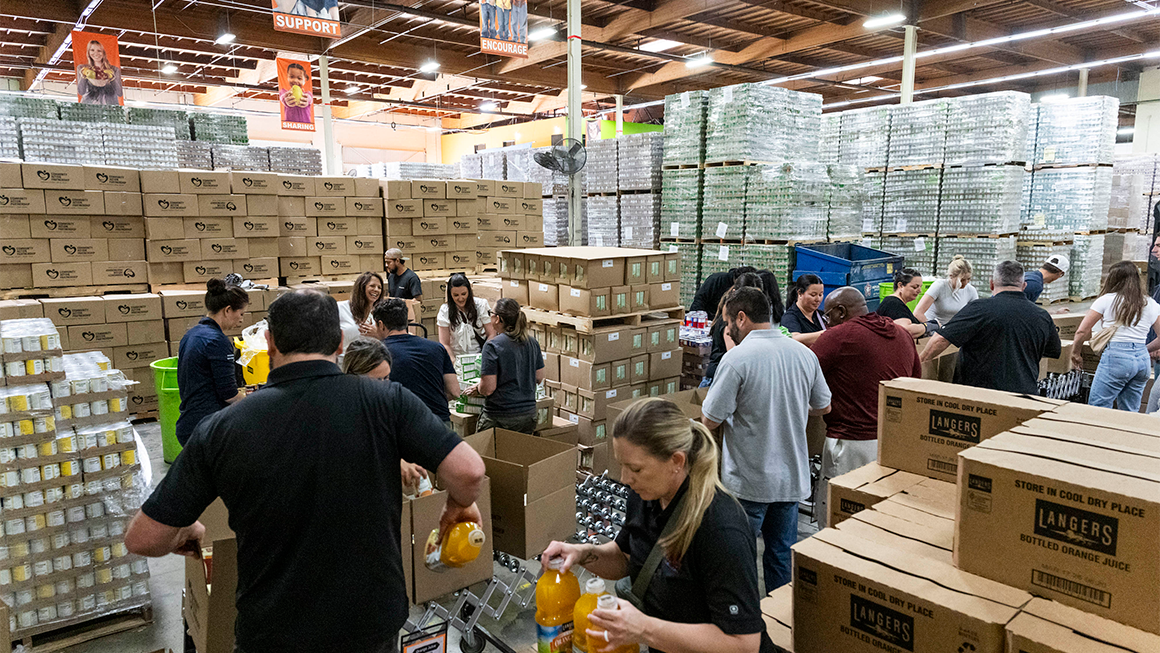
Across the country, food prices have increased substantially in recent years, financially straining families and local food banks and community organizations. Trying to fill this gap between family budgets and food expenses will get substantially harder when the One Big Beautiful Bill Act (OBBBA) is fully implemented. OBBBA will cut federal Supplemental Nutrition Assistance Program (SNAP) spending by $186 billion over the next decade through various benefit changes, eligibility restrictions, and cost-shifting measures.
Recent Urban Institute research finds these cuts would affect all 22.3 million families who receive SNAP benefits nationwide, 5.3 million of which would lose at least $25 dollars per month, for an average monthly loss of $146 in SNAP benefits. As these cuts go into effect, local food banks and other community organizations are likely to see increased demand as families struggle to purchase food.
In the DC metropolitan region, the Capital Area Food Bank, which serves more than 1.5 million food insecure families, is one of several organizations likely to be affected. We find that more than 230,000 families in the DC metro region will experience lower benefits or lose all their SNAP benefits because of federal assistance cuts.
SNAP cuts would affect working families and families with children in the DC metro region
We used the Analysis of Transfers, Taxes, and Income Security (ATTIS) microsimulation model to estimate the effects of OBBBA on families in the DC metro region. We compared eligibility and benefits under current law with eligibility and benefits when the new legislation is fully implemented. ATTIS models select OBBBA provisions, including caps on future benefit amount increases, expanded work requirements, new matching fund requirements, and more.
From this analysis, we find that among the 230,000 families affected by federal SNAP reductions in the DC metro region, about 50,000 would lose at least $25 per month. These families would experience an average loss of about $187 per month—much greater than the $146 average national loss. The average price of a meal in DC alone was about $4.50 at the end of 2024, meaning the average cut to SNAP benefits is the equivalent of about 40 meals per month.
The cuts would affect all SNAP recipients, including those with children and working families. About 26,000 families with children and 33,000 working families would lose at least $25 in SNAP benefits each month. Among those losing at least $25 per month, families with children would lose $107 in benefits per month and working families would lose $153 per month, according to our estimates.
However, the average loss in SNAP benefits would vary within the DC metro region. Families in DC projected to lose at least $25 in benefits are expected to lose on average $231 per month, compared with $164 and $154 per month for families in parts of Maryland and Virginia. The differential effects of the cuts may be because of state caseload characteristics, like family size or composition, the age of household members, or the extent to which participants are newly affected by the work requirement—all factors that may affect eligibility or benefit amounts.
DC-area families will need additional support
SNAP is an effective tool for reducing poverty, improving food security, and improving health outcomes, so cuts to the program may substantially affect family well-being. With food insecurity already on the rise before the enactment of OBBBA, the SNAP cuts may exacerbate hunger issues in the region.
All families receiving SNAP in the DC area will experience lower benefits as a result of OBBBA, and about 50,000 families will experience a substantial reduction or complete loss of their monthly benefit. Local policymakers and community organizations in the region will need to find creative solutions to address the nutritional needs of struggling families and fill the gaps between families’ food expenses and available resources.
Let’s build a future where everyone, everywhere has the opportunity and power to thrive
Urban is more determined than ever to partner with changemakers to unlock opportunities that give people across the country a fair shot at reaching their fullest potential. Invest in Urban to power this type of work.